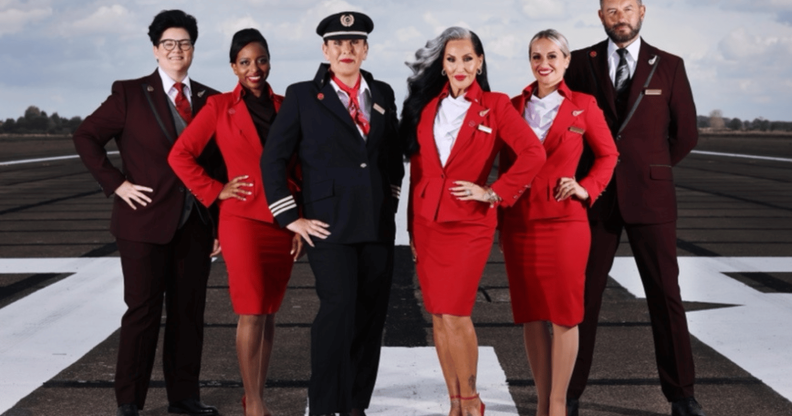Virgin Atlantic ditching gendered uniform rules met with ‘tremendous’ response

The company celebrated their policy update with a fashionable photoshoot. (Virgin Atlantic/Provided)
Job applications to Virgin Atlantic have doubled since its gendered uniform policy was scrapped.
More than 10,000 people applied for 750 cabin crew vacancies in the airline’s latest recruitment drive, a spokesperson told PinkNews.
Chief executive Shai Weiss told The Telegraph there was “a 100 per cent uplift in applicants following the campaign, ‘see the world differently’”.
Virgin Atlantic’s gender identity policy was updated in late September, removing the requirement for people to wear gendered uniforms and introducing optional pronoun badges.
Weiss said it had been a “tremendous” help for filling vacancies in an historically more conservative industry.
”When we get 10 applicants for every job – we’re in a really good position,” he said.
The airline previously made changes to allow visible tattoos and end its mandatory makeup rule for female staff.
When the policy was updated Virgin Atlantic said it was “part of an ongoing drive to champion the individuality” of staff and customers.
A sweep of other changes included amending ticketing systems to allow for non-binary gender markers, and mandatory inclusivity training for staff and hotel partners.
The airline cited a study it commissioned that found mental wellbeing and feelings of happiness increased when staff were allowed to embrace their individuality at work.
Last week, British Airways became the latest airline to modernise its uniform policy, although gendered uniforms remain.
Starting Monday (14 November), all BA employees can wear mascara, false eyelashes and earrings, as well as carry accessories including handbags.
Staff wearing makeup are encouraged to use “subtle shades” for a “natural look”, according to the updated rules. Black and neon nail polish colours are still prohibited.
Similarly to Virgin Atlantic, BA said the updated guidelines allowed staff “to bring the best, most authentic version of themselves to work every day”.
The latest changes come just over a year after the airline opted for gender inclusive language for its on-board greeting instead of “ladies and gentlemen”.

